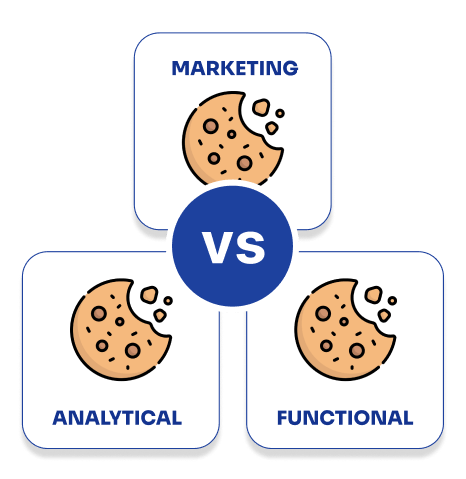Introduction
Cookies are an essential component of how websites operate and interact with users. Understanding the different types of cookies—specifically marketing cookies, analytical cookies, and functional cookies—is crucial for website owners and marketers alike. This article explores these cookie categories, their purposes, how they function, and what sets them apart from one another.
Understanding Cookies: An Overview
Cookies, also known as internet cookies, are small data files that websites store on a user’s device through their web browser. These cookies are placed on a user’s device to enhance website functionality by tracking user actions and preferences. They enable website owners to track user visits, enhance user experience, and collect information about browsing habits. When a user visits a website, the site can place cookies on their device, which can later be accessed by the same website or by third-party services. This practice plays a significant role in online marketing and analytics.
Cookies exist in various forms, such as session cookies and persistent cookies. Session cookies are temporary and are deleted once the user closes their browser. Persistent cookies remain on the user’s device for a set duration or until they are manually deleted. Both types serve different purposes, with persistent cookies often used for remembering user preferences and login details across multiple visits.
The Role of Cookies in Marketing
Marketing cookies, also known as advertising cookies, are specifically designed to collect information about users’ browsing habits. They help website owners track users across different web pages and identify users online. This data is invaluable for creating targeted marketing campaigns and improving personalized advertising.
By tracking user activity on their website and third-party websites, marketers can collect user information that aids in building comprehensive user profiles. Social media cookies play a crucial role in this process by tracking user activity and enabling content sharing through social media features. This allows businesses to serve personalized ads through platforms like Google Ads, ensuring that their marketing messages reach the right audience at the right time. Consequently, marketing cookies are instrumental in enhancing the effectiveness of online marketing strategies.
Analytical Cookies: Tracking User Behavior
Analytical cookies play a critical role in understanding user behavior on a website. They help website owners gather data about how users interact with their site, including the pages they visit, the time spent on each page, and how they arrived at the site. These cookies are created and stored in the user’s browser to track user behavior. Tools like Google Analytics rely heavily on these cookies to provide insights that aid in improving website functionality and user experience.
The information collected through analytical cookies allows businesses to analyze traffic patterns and identify areas for improvement. By understanding user preferences and behavior, website owners can optimize their sites for better performance and more engaging content. Moreover, analytics tools equipped with these cookies enable website owners to make data-driven decisions to enhance their online presence.

Functional Cookies: Enhancing User Experience
Functional cookies, also known as functionality cookies, are essential for ensuring that a website functions properly. These cookies store user preferences, such as language settings and login details, allowing for a more streamlined browsing experience. Without functional cookies, users may have to re-enter their information each time they visit a site, leading to frustration and a less personalized experience.
These cookies are considered strictly necessary for a website’s basic functionality and typically do not require user consent for placement. However, users can still choose to delete cookies from their browsers if they prefer not to have their preferences stored. By doing so, they can enhance their privacy but may sacrifice some convenience during future visits.
Types of Cookies: A Closer Look
Cookies can be classified into several categories based on their purpose and functionality. The primary types of cookies include:
First-party cookies: Set by the website the user is visiting, these cookies are used for essential functions and can enhance user experience by remembering preferences.
Third-party cookies: Placed by domains other than the one the user is visiting, third-party cookies are frequently utilized by third-party advertising partners for advertising and tracking purposes.
Session cookies: Temporary cookies that expire once the user closes their browser, these cookies help track user activity during a single session.
Persistent cookies: Cookies that remain on the user’s device for a predetermined period, often used for remembering login details and user preferences across multiple visits.
Understanding these types of cookies is vital for website owners who wish to implement effective cookie usage and comply with data protection regulations.
Performance Cookies
Performance cookies are instrumental in monitoring and analyzing website performance. They collect data on user interactions, such as page views, bounce rates, and conversion rates. This information is invaluable for website owners looking to optimize their site and improve user experience. Often provided by third-party analytics platforms like Google Analytics, performance cookies help identify areas for improvement. While not essential for the website to function properly, they significantly contribute to enhancing the overall user experience by providing insights that drive better performance.
Cookie Consent and User Preferences
With increasing concerns about privacy and data protection, obtaining user consent for cookie usage has become a critical aspect of web operations. Many websites now display cookie banners that inform users about the types of cookies used and seek explicit consent before placing non-essential cookies.
Consent management platforms play a crucial role in this process, allowing website owners to manage cookie preferences effectively. Users can typically choose which categories of cookies they accept, such as functional cookies, analytical cookies, or marketing cookies. This flexibility enhances user control over their data while allowing website owners to collect valuable information for their marketing campaigns.
The Importance of Privacy in Cookie Usage
Privacy concerns surrounding cookie usage have led to stricter regulations and guidelines, such as the General Data Protection Regulation (GDPR) and the California Consumer Privacy Act (CCPA). These laws require website owners to inform users about their data collection practices and obtain explicit consent for non-essential cookies.
Website owners must be transparent about their cookie policies, including what types of cookies they use, what data they collect, and how that data is used. By ensuring compliance with privacy regulations, businesses can build trust with their website visitors and create a more secure online environment.

Tracking Users: The Mechanism Behind Cookies
Cookies enable website owners to track users effectively, allowing for a deeper understanding of user behavior. When a user visits a website, cookies are placed on their device to collect information about their activity. This can include the pages visited, the duration of visits, and interactions with specific elements on the page.
By leveraging this data, website owners can create a personalized browsing experience for their users. For instance, e-commerce sites can utilize cookies to track items in an online shopping cart, allowing users to resume their shopping journey seamlessly. Moreover, tracking cookies can help identify trends and patterns that inform marketing strategies and improve site functionality.
Third-Party Cookies: The Controversy
Third-party cookies have become a contentious issue in the digital landscape, primarily due to privacy concerns. Unlike first-party cookies, which are set by the website being visited, third-party cookies are placed by external domains and are often used for tracking users across multiple websites. This allows third-party advertising partners to build comprehensive profiles of users based on their browsing behavior.
The use of third-party cookies has raised questions about user consent and data privacy, prompting many web browsers to phase out or restrict their usage. For example, Google Chrome has announced plans to eliminate third-party cookies by 2024, pushing the industry toward alternative tracking methods that prioritize user privacy.
Advertising Cookies: Personalization and Targeting
Advertising cookies, a subset of marketing cookies, are crucial for delivering personalized ads to users. By tracking user activity and preferences, these cookies enable advertisers to serve targeted advertisements that align with users’ interests. This personalized approach enhances the effectiveness of marketing campaigns and can lead to higher conversion rates.
These cookies work by collecting data about user behavior, such as the websites visited, items clicked, and search queries entered. This information allows advertisers to create tailored marketing messages that resonate with users, ultimately leading to a more engaging online experience.
The Intersection of Cookies and Analytics
Analytics tools are heavily reliant on cookies to collect data about user interactions with a website. By employing analytical cookies, website owners can gain valuable insights into user behavior, traffic patterns, and website performance. This data can then be used to make informed decisions about site design, content strategy, and user experience improvements.
The intersection of cookies and analytics is critical for optimizing marketing efforts. By understanding how users engage with content, businesses can tailor their marketing campaigns to meet user preferences better and drive conversions.

The Impact of Cookies on User Experience
Cookies significantly impact the user experience by enabling personalized browsing experiences. By remembering user preferences and settings, cookies allow for a more seamless interaction with websites. Users can enjoy features such as saved login details, language preferences, and customized content based on their past interactions.
However, the misuse of cookies can lead to negative experiences, especially when users feel their privacy is compromised. Striking a balance between personalization and privacy is crucial for website owners to maintain user trust while delivering a satisfying browsing experience.
Cookie Security Features
Cookies come with several security features designed to protect user data. One such feature is the Secure attribute, which ensures that cookies are transmitted over a secure channel, such as HTTPS. Another important feature is the HttpOnly attribute, which prevents cookies from being accessed by client-side scripts, thereby reducing the risk of cookie theft. Additionally, the SameSite attribute can be set to restrict cookies to being sent only with requests initiated by the same site, mitigating the risk of cross-site request forgery (CSRF) attacks. These security measures are crucial in maintaining the integrity and confidentiality of user data.
Deleting Cookies: User Control and Privacy
Users have the option to delete cookies from their browsers, giving them control over their online privacy. Deleting cookies can be beneficial for users who want to remove stored data that may include tracking information, login details, or other personally identifiable information.
Most web browsers provide options for managing cookies, allowing users to delete all cookies or selectively remove specific cookies associated with particular websites. This empowers users to take charge of their data and enhance their privacy online. However, it’s important to note that deleting cookies may impact the functionality of websites, as user preferences and settings may be lost.
Managing Cookies on Different Browsers
Different web browsers offer various options for managing cookies, including settings for accepting, rejecting, or deleting cookies. For instance, users can adjust cookie settings in browsers like Google Chrome, Mozilla Firefox, and Safari to align with their privacy preferences.
Website owners should consider providing guidance on managing cookies for their visitors, helping them understand how to control their cookie settings. This can enhance user trust and provide a more transparent browsing experience, ultimately benefiting both users and website owners.

Future of Cookies: Trends and Changes
The future of cookies is evolving, especially with the increasing focus on privacy and data protection. As major web browsers move toward phasing out third-party cookies, website owners must adapt to new tracking methods that respect user privacy.
Emerging technologies, such as first-party tracking solutions and server-side tracking, are being explored as alternatives to traditional cookie usage. These methods aim to provide valuable insights while minimizing privacy concerns, ensuring that users can enjoy personalized experiences without compromising their data security.
The Role of Cookie Banners
Cookie banners have become a standard practice for websites seeking to comply with privacy regulations. These banners inform users about cookie usage and seek their consent before placing non-essential cookies. By providing clear information about the types of cookies used and their purposes, website owners can build transparency and trust with their visitors.
Effective cookie banners should be designed to be user-friendly and easily accessible, allowing users to make informed choices about their cookie preferences. This is essential for creating a positive user experience and ensuring compliance with data protection laws.
Best Practices for Cookie Management
Website owners can follow best practices for cookie management to enhance user experience while respecting privacy:
Be Transparent: Clearly communicate the types of cookies used and their purposes in a dedicated cookie policy.
Obtain Consent: Use cookie banners to seek explicit consent for non-essential cookies.
Provide Options: Allow users to customize their cookie preferences and easily manage their settings.
Regularly Review: Update cookie policies and practices to comply with changing regulations and user expectations.
By adhering to these best practices, website owners can foster trust and ensure a more responsible approach to cookie usage.
Conclusion
In conclusion, understanding the differences between marketing, analytical, and functional cookies is essential for website owners and marketers. Each cookie type serves a unique purpose, contributing to the overall functionality and effectiveness of a website. As privacy concerns continue to shape the digital landscape, businesses must adapt their cookie usage strategies to align with user expectations and regulatory requirements.
By implementing transparent cookie practices, obtaining user consent, and embracing emerging technologies, website owners can create a more user-friendly and privacy-conscious online environment. The future of cookie usage lies in striking a balance between personalization and privacy, ensuring that users can enjoy tailored experiences without compromising their data security.




